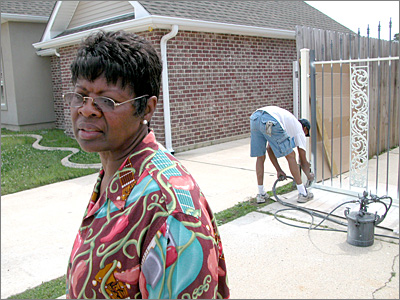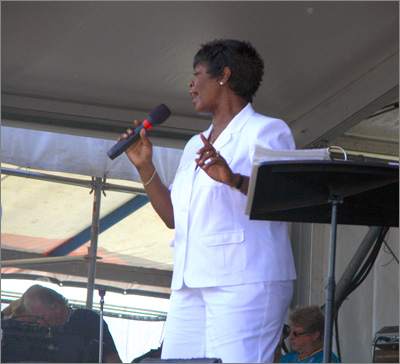
R&B singer Irma Thomas stands in front of her newly rebuilt house in New Orleans. - photo by Kate Ellis

Legendary rhythm and blues singer, Thomas reflects on the effects Katrina has had on her career.
In the world of rhythm and blues, Irma Thomas is one of the most beloved voices of New Orleans. So it made national news when it seemed she went missing after Hurricane Katrina. People quickly learned it wasn't true, but the report had a surprising effect. It kicked off a major resurgence in her career. "When people discovered Fats Domino and I were not missing, we became quite valuable. I've been busy ever since," she says.
Hurricane Katrina yielded countless stories of churning loss. That's mainly what big hurricanes do. They take things away. But for Irma Thomas and a few other major New Orleans musicians, the storm also brought them something: more work and greater recognition. For Thomas, that included winning her first Grammy. Now she's back in New Orleans, rebuilding her own life and hoping to pull others along.
After Katrina hit, Irma Thomas watched reports of the New Orleans flood from a hotel room in Austin, Texas. She was stranded there with her band and her husband, Emile Jackson. When the television showed the eastern end of the city, where Thomas lived, she wondered aloud how much water her home was getting. "As I was saying that," she says, "one of the cameras caught a street sign you see when you come east into New Orleans. And the water was right under the sign, lapping up against the sign." Thomas turned to Jackson and said, "Honey, we don't have a home to go home to."
Technically, Thomas was wrong. They did still have a home. It is solid brick and it was still standing. Nearly everything inside, though, was ruined.
Irma Thomas is in her mid-60s. She has a deep voice and rolling, husky laugh. Thomas was born in Ponchatoula, La., but grew up in New Orleans. She got her start in music early, during the days of Jim Crow. Thomas was 19 when she hit the road with her band in 1960. It was not long after she'd been fired from two different jobs - for singing.
The first job was washing dishes. "I had the 11 p.m. to 7 a.m. shift and I would sing to keep myself company," she says. "I had a prejudiced boss who didn't want to hear what he called 'nigger music.'" So he fired her.
The second job was working as a waitress at the Pimlico Club. Live bands played at the Pimlico and every night Thomas would sit in for a couple songs. "It got to the point where the band leader, Thomas Ridgly, was asking for the singing waitress," she says. "And, of course, another prejudiced boss fired me." Days later Ridgely took Thomas to audition at a local record label. Days after that she cut her first single, "You Can Have My Husband (But Don't Mess With My Man)," and her music career was launched.

Irma Thomas performs at Jazzfest 2007. - photo by Kate Ellis
Irma Thomas' life has taken some odd twists and turns, often because of a storm. In 1969 Hurricane Camille wrecked all the clubs where she regularly performed along the Mississippi Gulf Coast. So in 1970 she picked up her family and moved to California. She spent six years there, selling lingerie and then auto parts at Montgomery Ward. But her music career eventually picked up again. She moved back to Louisiana in 1976 and sealed her reputation as the soul queen of New Orleans.
By 2005, Thomas felt her career was sputtering. After so many decades it just didn't seem worth it to beat the bushes for jobs and travel for gigs. "I'm older now," she says, "and when I'm on stage nothing hurts. The minute I walk off, all hell breaks loose."
Still, before Katrina hit, Thomas had been planning a new record with her long-time producer, Scott Billington, of Rounder Records. They'd selected all but two of the songs for the album, which they intended to record in New Orleans. But the flood that followed Katrina wrecked the studio they'd booked for the session. They wound up at a South Louisiana studio some 100 miles west of the city.
Billington says the studio was a wonderful place to make music. It was peaceful, by a river. Before anyone could play music, though, they had to talk. "One by one the musicians showed up, and everybody had a story to tell about what they'd been through, where they'd been, and what they'd lost," Billington says.
Billington and Thomas had selected a range of old blues tunes, and when Thomas sang them in the studio they took on new meaning. "Every musician on that session was a New Orleans musician who'd been hit by the devastation. The whole session had a different feel to it. We were all feeling the influence of Katrina," Thomas says.
Thomas and Billington were surprised, in fact, at how many of the songs sounded like they were about the storm. "That song about the waters coming in," she says - referring to "Another Man Done Gone" - "I just relived that all over again. You could close your eyes and see all the folk who were leaving." Thomas continues, "The one line called 'ain't got no place to go,' I had to stop myself and collect myself. I did several takes on that because it was hitting home."
Thomas says making the record was part of her "recovery therapy." Scott Billington agrees. "It was a great release," he says, "and it was great to be back making music again."
Billington says no one expected their record to win a Grammy. He and Thomas had made two other records nominated for a Grammy in the past and never won. Just before the awards ceremony Billington flew out to see Thomas so he could console her in person. But in 2007, "After the Rain" won a Grammy for best contemporary blues album. Billington says, "I think a big reason we won is that people could hear in Irma - this embodiment through music - the stories people had been through after Katrina."
In the spring of 2007, just before Thomas was to make her annual appearance at the New Orleans Jazz and Heritage Festival, she and her husband moved back into their house in New Orleans East. The inside had been gutted and rebuilt. The living room was bare but for a single couch. Thomas had been waiting at home all day for the phone company to come hook up service, but they never showed.
Unlike many New Orleans musicians, Thomas never really considered moving away after Katrina. "Irma Thomas was determined to come back to New Orleans," Scott Billington says. "She rebuilt her house in East New Orleans at considerable expense. I don't think too many of her neighbors had come back, but she wanted to set an example and say 'Look. We're coming back. Don't let this flood stop you.'"
Thomas knows many musicians can't afford to return to the city yet, especially those who were renting before the storm. But Thomas believes most musicians who can return to the city eventually will. "There's something about this city that's infectious," she says, adding, "Once you get hit with it, you can't totally walk away."
When Thomas talks about the future of New Orleans she is by turns optimistic and realistic. "Anything can be brought back if you want it bad enough. This city is coming back," she says. "Now mind you, it won't be the city we knew. Once something has been devastated to the degree this city was, it won't ever be the way it was."
Still, Thomas is thrilled to be home. "We're showering in the shower," she says, "and we're brushing teeth and washing faces in the utility sink in the garage." Thomas says she's accustomed to camping out. "I came up in an area where the outhouse was where you had to go, and you wash your face in a basin and you brush your teeth on the corner of the porch." Thomas laughs and slaps her knee, "This is luxury compared to those days."
More from Routes to Recovery
| 
